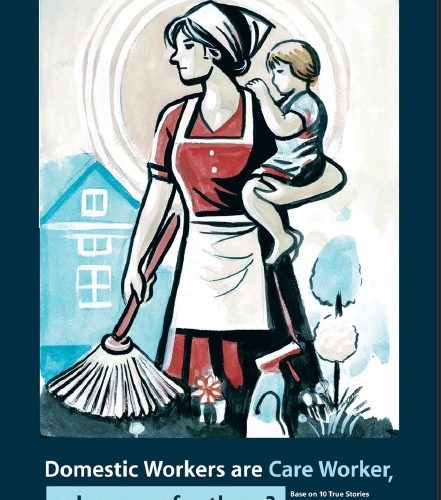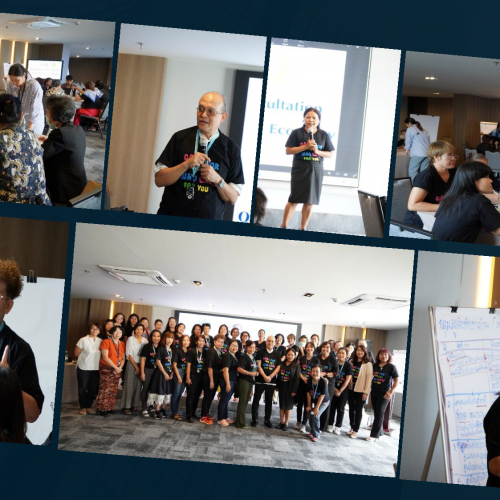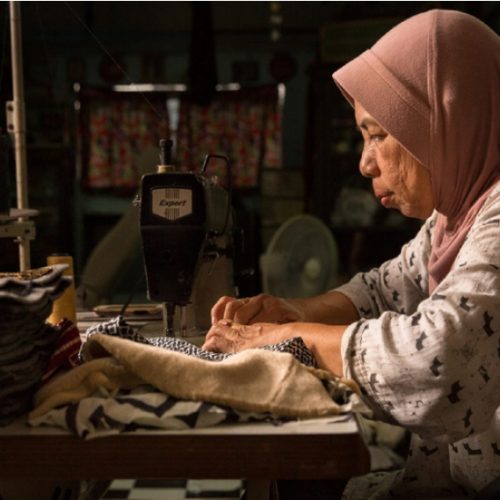The lack of working capital as well as lack of access to credit has always been a problem for a group of home-based workers, both own- account and homeworkers, operating micro, and small businesses. This causes neither individuals nor groups are incapable to stock raw materials. Resulting in their inability to receive large quantity of orders, cannot develop production process to have higher productivity and safety. If investing in such matters, they may need to borrow money from informal money lenders with high interest rates and fall into heavy debt that makes a big burden for them.
Therefore, it is essential for HomeNet Thailand to provide small credit to members as a working capital to restore their livelihoods and supporting economic recovery post the impact of Covid-19 pandemic.
“Livelihood and Economic Recovery Fund for members of the Northeastern Homebased Workers Network” began in September 2020 with a capital of 180,000 Thai Baht (180,000 THB is equal to 6,000 USD.) (80,000 THB from the network’s saving and 100,000 THB supported from Fondation Chanel). The network committee met and agreed on important rules as follows:
- The operation will emphasis as a loan fund with free interest to decrease burden of borrowers. However, the Network will collect borrowing fee only 3 percent of loans per year and spend it as operation cost. It is understood among members that with a few borrowing fees, the fund will grow slowly.
- The Fund can be lent to both individuals and groups because it is aware that the need for money may occur at both levels, individual and group. The difference between an individual and a group is the limit of funds. (Individual can borrow not more than 10,000 THB per time, and the group can borrow not more than 20,000THB at a time)
- If the borrower is an individual, it must be guaranteed by the head of his or her group. From this practice, the Fund committee will be confident in the financial responsibility of the borrower and ensure that borrowing money will be spent according to the objectives stated.
- If the borrower is a group, it must have at least 3 group’s committee members signed together in the borrowing form to show mutual responsibility.
- The borrower must specify his or her borrowing purpose and details of the use of money, such as the price of materials, and equipment to buy for the fund committee to use as information for lending consideration.
- When starting the fund, it was agreed to lend only for the livelihood development purpose. After about a year, to mitigate suffering of the network members, the rules were updated by allowing members to be able to borrow the fund for use in necessities other than livelihood development. Later, it was found that members have borrowed to use in other difficulties such as informal debt, spending on family member illnesses, expenses for children’s education, home repairs, etc.
- Repayment will be done monthly by 1,000 THB until the borrowed limit is reached. Paid back as a monthly installment will help reduce the burden of the borrowers than paying back in large sums in a single payment at the end of the time.
Until March 2023, the Fund has considered lending money 8 times. 69 people (Some members and some groups have borrowed money more than once.) have borrowed. With the responsibility of network members who are borrowers and devotion of the Fund committees, results of the fund operation are considered good. The objectives of the fund are achieved in restoring members’ livelihood and economy as well as mitigation suffering of network members. Existence of only 3 overdue cases (equivalent to 4 percent of borrowers) who couldn’t work cause of health problems.
There are many examples of successes that have occurred over the two and a half years of the operation of “Economic Rehabilitation Fund for members of the Northeastern Informal Workers Network” such as.
- Network members from the Beauty Salon Club Mahasarakham Province which is a group that is greatly affected by the government’s lockdown announcement during the severe epidemic Covid-19. They earned zero income for almost a year. The Club borrowed money from the Fund to buy equipment and renovate members ‘shop which 7 members could gain these benefits.
- Plastic Basket Weaving Group at Non-Nong Wat 4 Community, Khon Kaen Province, which has 10 members, its sales have decreased by 70% due to the impact of COVID-19. The group’s president borrowed money from the Fund 3 times, firstly 10,000 THB, secondly 10,000 THB, and thirdly 8,000 baht to buy plastic strands, which are essential raw materials in basket production. In addition, they received online marketing training from Homenet Thailand and creating continuously advertising their products through Facebook. Currently, members can earn an average of about 300-400 THB per day, which is a good sign for economic recovery.
- Before the outbreak of Covid-19, there were the claim for compensation of the fishing net homeworkers according to the piece rate calculation specified in the Homeworkers Protection Act, caused a fishing net factory to reduce sub-contracted work to the homeworkers at Baan Lao Kwien Hug in Khon Kaen. Previously, work was sub-contracted to 12 homeworkers working as leaders of the production line. After the claim, the company sent the work to only one leader of the production line, so it made several homeworkers jobless. 6 homeworkers leaders borrowed money from the Fund, 10,000 THB per each person, to invest in buying raw materials for assembling the fishing net. It gave them the possibility to change their status from homeworkers to own-account workers who produce fishing net for sales. By selling produced fishing nets to another factory, 5-6 independent merchants and selling online at a price increase, they can hire 80 homeworkers to return to work continuously and receive an increase of 50-66 percent income. In the past, they used to get 10-15 THB per piece to produce a fishing net, at present, they get 15-25 THB per piece instead.
From the example mentioned above, although this Fund is not a big amount of money but in just two years, this fund has helped nearly 100 members of the Northeastern home-based workers to recover from the Covid-19 crisis. Under supporting of HomeNet Thailand the same type of fund is operated in the Homebased Workers Network in northern, central, southern and Bangkok, Thailand. It created positive results to economic recovery among homebased workers’ members of Homenet Thailand Association.
Suntaree Hattee Seang-ging
Homenet Thailand
April 2023






